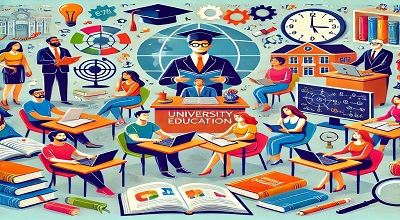Further Education
Further Education (FE) refers to ed and training that takes place after a person has completed their compulsory education, typically at the age of 16 in many countries. Further Ed is often considered a bridge between compulsory education and higher education (university or college) or the workforce. It is designed to provide individuals with additional knowledge, skills, and qualifications to help them pursue their chosen careers or further academic goals.
Key aspects of further Ed include:
- Diverse Offerings: Further education encompasses a wide range of programs and courses, catering to various interests and career paths. These can include vocational and technical courses, apprenticeships, adult education, community ed, and more.
- Vocational Training: Many further ed programs focus on practical skills and vocational training, preparing students for specific industries or professions. This can include fields such as healthcare, construction, engineering, hospitality, and the arts.
- Qualifications: Further Ed often results in the attainment of qualifications and certifications, which can be nationally or internationally recognized. These qualifications can vary in level and may include certificates, diplomas, and other vocational awards.
- Flexibility: FE institutions typically offer flexible learning options to accommodate various student needs, including part-time courses, evening classes, online learning, and apprenticeship programs.
- Career Advancement: Further Ed can help individuals enhance their existing skills, acquire new ones, and improve their employability. It can also serve as a pathway to higher education for those who wish to pursue a degree after completing their FE studies.
- Lifelong Learning: Further Ed is not limited to young adults; it is also available to adults seeking to upgrade their skills, change careers, or simply pursue lifelong learning goals.
Summary of Further Education
In different countries, further education may have varying names and structures. For instance, in the United Kingdom, it is often referred to as “further ed and training” and includes colleges, apprenticeships, and adult education programs. In the United States, it is similar to community colleges and technical schools that offer a wide range of courses beyond high school.
The specific offerings and organization of further ed can vary significantly from one region to another, but the overarching goal is to provide individuals with the opportunity to acquire the knowledge and skills needed to succeed in their chosen career paths or educational pursuits.
What are the Examples of Further Ed?
Further education encompasses a wide range of educational and training opportunities. Examples of further ed programs and courses include:
Vocational Courses:
These courses are designed to provide specific skills and knowledge related to a particular trade or profession. Examples include:
- Plumbing
- Electrician training
- Welding
- Automotive repair and maintenance
- Cosmetology and beauty therapy
- Carpentry and construction
Apprenticeships:
Apprenticeship programs combine on-the-job training with classroom instruction, allowing individuals to earn while they learn. Examples include apprenticeships in:
- Healthcare (e.g., nursing)
- Information technology
- Culinary arts
- HVAC (heating, ventilation, and air conditioning)
- Plumbing and pipefitting
Diploma and Certificate Programs:
These programs offer specialized education in various fields and typically result in the awarding of diplomas or certificates. Examples include:
- Business administration
- Graphic design
- Early childhood ed
- Web development
- Legal studies
- Digital Marketing
Adult Education:
Adult education programs cater to individuals who want to improve their basic skills or acquire new ones. Examples include:
- Adult literacy and numeracy classes
- English as a Second Language (ESL) courses
- GED (General Educational Development) preparation
- Life skills workshops
Community College Courses:
Community colleges offer a wide array of further ed options, including:
- Associate degree programs in various fields (e.g., nursing, engineering, liberal arts)
- Technical and trade programs
- General education courses that can transfer to a four-year university
Professional Development and Continuing Education:
Many adults engage in further education to enhance their professional skills and credentials. Examples include:
- Continuing education courses for teachers and educators
- Leadership and management training
- Healthcare professionals updating their skills through continuing medical education (CME)
- IT professionals pursuing certifications (e.g., CompTIA, Cisco)
Arts and Creative Courses:
These programs focus on developing artistic and creative talents. Examples include:
- Music and performing arts classes
- Visual arts and design courses
- Creative writing workshops
- Photography and filmmaking courses
Healthcare Training:
Programs in the healthcare field that prepare individuals for careers in healthcare. Examples include:
- Certified Nursing Assistant (CNA) training
- Medical assistant programs
- Dental hygienist programs
- Radiologic technology programs
Trade Union Education:
Some trade unions offer further ed and training programs for their members, helping them improve their skills and advance in their careers. Examples include trade-specific training offered by unions for electricians, plumbers, and more.
These are just a few examples of the diverse range of further education opportunities available to individuals. The specific programs and courses offered can vary by region and institution, and they are designed to meet the educational and career needs of a wide range of learners.
